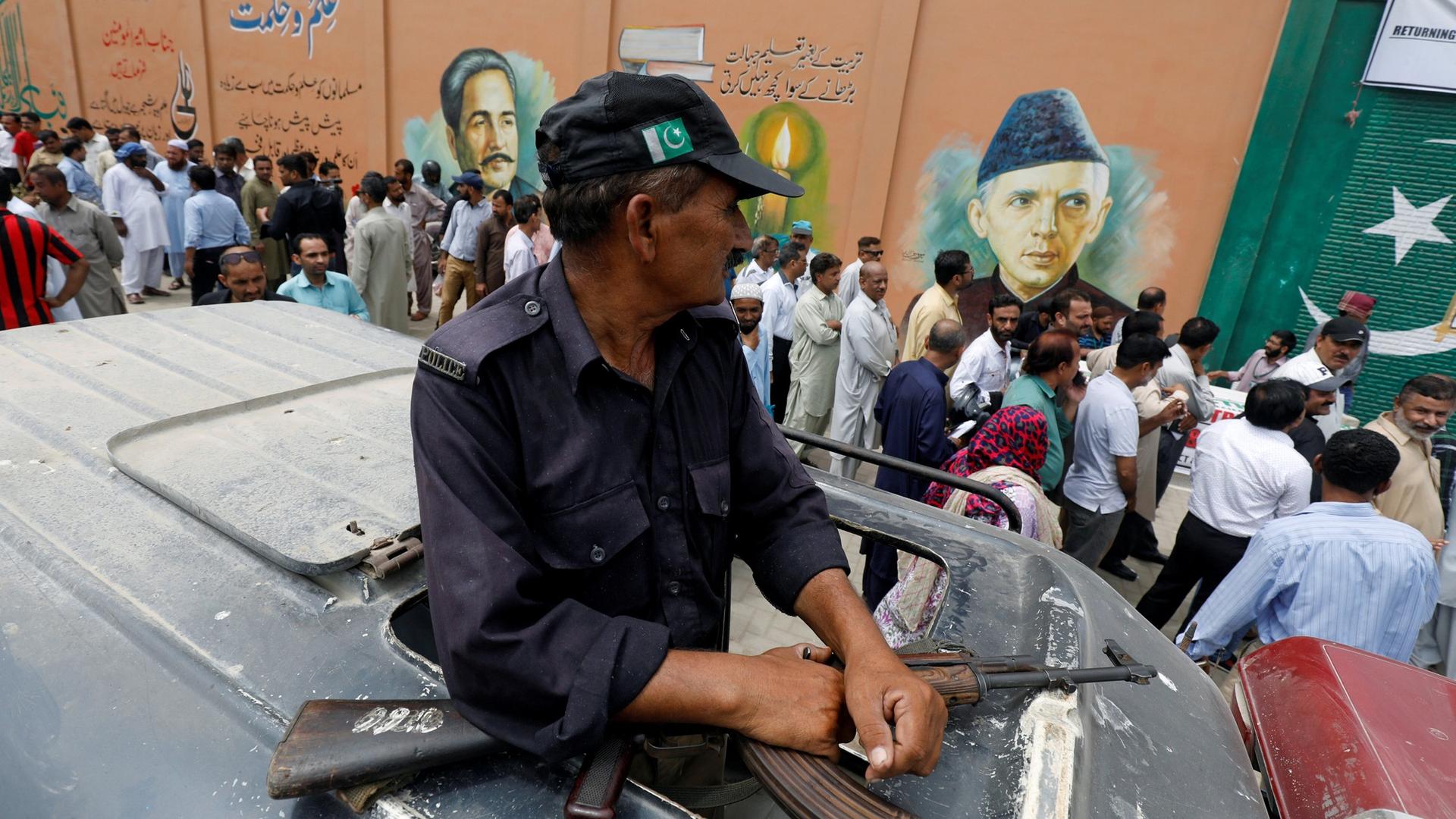Suicide bomber kills dozens as Pakistanis vote in cliffhanger election
Electoral workers stand in line to collect election materials ahead of general election in Karachi, Pakistan, July 24, 2018.
ISIS has claimed responsibility for a suicide bomber that killed at least 29 people near a polling center on Wednesday. The attack came as Pakistanis voted in a knife-edge general election pitting cricket hero Imran Khan against the party of jailed ex-Prime Minister Nawaz Sharif.
A hospital spokesman said 35 others wounded in the attack that a Reuters witness said occurred near a voting center in Quetta, the capital of Baluchistan province.
Earlier this month, a suicide bomber killed 149 people at an election rally in the town of Mastung in Baluchistan province. That attack was also claimed by ISIS.
About 371,000 soldiers have been stationed at polling stations across the country to prevent attacks, nearly five times the number deployed at the last election in 2013.
According to the latest opinion polls, neither Khan nor Sharif are likely to win a clear majority in the election.
Khan has emerged as a slight favorite in national opinion polls, but the divisive race is likely to come down to Punjab, the country’s most populous province, where Sharif’s party has clung to its lead in recent surveys.
The election has been plagued by allegations the powerful armed forces have been trying to tilt the race in Khan’s favor after falling out with the outgoing ruling party of Sharif, who was jailed on corruption charges this month.
“Imran Khan is the only hope to change destiny of our country. We are here to support him in his fight against corruption,” said Tufail Aziz, 31, after casting his ballot in the northwestern city of Peshawar.
About 106 million people are registered to vote in polls due to close at 6 p.m. The likely winner should be known by around 2 a.m. on Thursday.
Whichever party wins, it will face a mounting and urgent in-tray, from a brewing economic crisis to worsening relations with on-off ally the United States to deepening cross-country water shortages.
An anti-corruption crusader, Khan has promised an “Islamic welfare state” and cast his populist campaign as a battle to topple a predatory political elite hindering development in the impoverished mostly-Muslim nation of 208 million people, where the illiteracy rate hovers above 40 percent.
“This is the most important election in Pakistan’s history,” Khan, 65, said after casting his vote in the capital Islamabad.
“I ask everyone today — be a citizen, cherish this country, worry about this country, use your vote.”
Khan has staunchly denied allegations by Sharif’s Pakistan Muslim League-Nawaz (PML-N) party that he is getting help from the military, which has ruled Pakistan for about half of its history and still sets key security and foreign policy in the nuclear-armed nation. The army has also dismissed allegations of meddling in the election.
Struggle to win
Khan’s Pakistan Tehreek-e-Insaf (PTI) party has inched ahead of PML-N in recent national polls, but even if it gets the most votes, it will likely struggle to win a majority of the 272 elected seats in the National Assembly, raising the prospect of weeks of haggling to form a messy coalition government.
Such a delay could further imperil Pakistan’s economy, with a looming currency crisis expected to force the new government to turn to the International Monetary Fund for Pakistan’s second bailout since 2013. PTI has not ruled out seeking succor from China, Islamabad’s closest ally.
Sharif’s PML-N has sought to turn the vote into a referendum on Pakistan’s democracy, and has said it was campaigning to protect the “sanctity of the vote.”
The Pakistan Peoples Party (PPP), which has been overtaken by Khan’s PTI as the main challenger to PML-N but is widely seen as the likely kingmaker, has also alleged intimidation by spy agencies.
Sharif’s PML-N has been touting its delivery of mega infrastructure projects, especially roads and power stations that helped hugely reduce electricity blackouts, as proof the country is on the path to prosperity.
“If we get the opportunity, we will change the destiny of Pakistan,” said Shehbaz Sharif, brother of Nawaz and the PML-N president, as he cast his vote in Lahore. “We will bring an end to unemployment, eradicate poverty and promote education.”
PML-N’s lackluster campaign was reinvigorated by the return to Pakistan of Nawaz Sharif, 68, who was earlier this month convicted and sentenced in absentia to 10 years in prison over the purchase of upscale London apartments using offshore companies in the mid 1990s. He has denied any wrongdoing.
The election will be only the second civilian transfer of power in Pakistan’s history.
Khan has in recent years shed his playboy image and adopted a more pious and conservative persona. He has vowed to create 10 million jobs if he comes to power and promised to build “world class” schools and hospitals.
(GRAPHIC-Pakistan Election: https://tmsnrt.rs/2LaIlGt)
By Gul Yousafzai Jibran Ahmad/Reuters
Additional reporting by Syed Raza Hassan in Karachi and Mubasher Bukhari in Lahore; Writing by Drazen Jorgic; Editing by Alex Richardson and Raju Gopalakrishnan.
